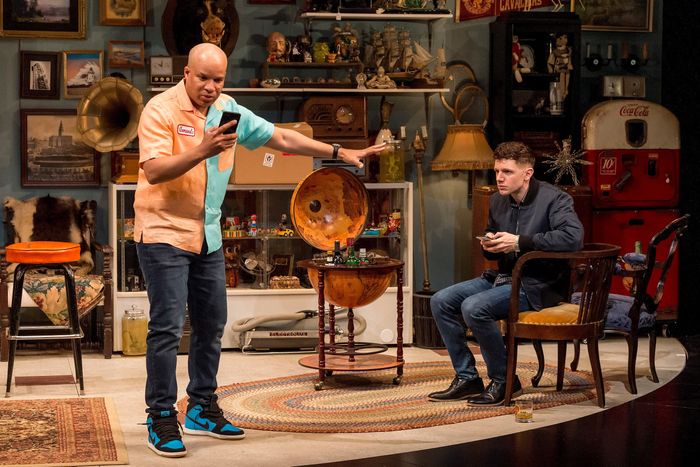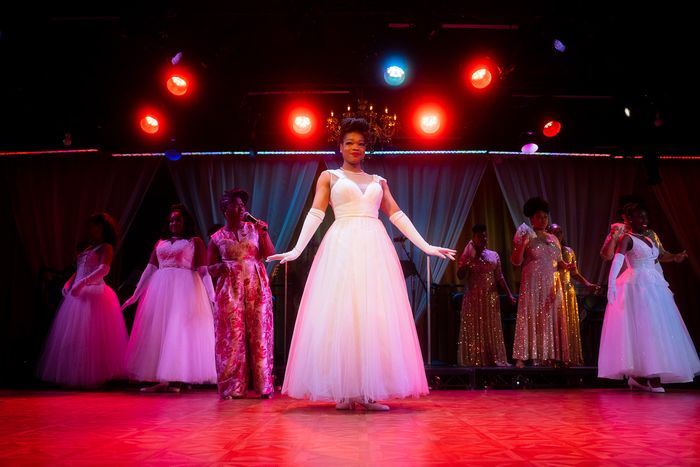
I have been thinking a lot recently about the logistics of friendship — what it takes to bring two people together and get them over the mysterious barrier separating acquaintanceship from an actual bond. Maybe that preoccupation comes from the still-climbing-out-of-a-pandemic feeling of reestablishing regular ways to spend time with people, or maybe it’s egged on by panicky articles about how Americans don’t spend as much time with friends anymore, or maybe I’ve just run into that classic problem of realizing it’s harder to make friends when you’re an adult and everyone has a job. Luckily for me, Rajiv Joseph, in King James, is exploring similar questions, examining one close friendship with a sharp eye and genial warmth. It’s a hangout drama about the unspoken dynamics of hanging out.
The play, nominally, is about LeBron James, and it kicks off in Cleveland in 2004 when LeBron was a breakout rookie. Matt (Chris Perfetti) is working at a tacky wine bar, looking to sell his sick dad’s newly valuable season tickets to the Cavaliers to get out of a debt to Shawn (Glenn Davis), who’s just come into a bit of money after selling a short story. As they negotiate over the sale price — Joseph is great at writing the bluster of 21-year-old guys pretending to be more worldly than they are — they reveal that they’re both big Cavs diehards, isolated in their obsessions. Soon, Shawn is offering to take Matt to the games with him, and as the play skips ahead to 2010, 2014, and 2016, Joseph tracks how their friendship grows in and out of step with LeBron’s career.
If you’re somewhat familiar with basketball, as I am thanks to my enthusiastic brother, you may anticipate some of the twists and turns ahead — it’s good to know that LeBron left Cleveland for Miami and later returned, at least — though Joseph holds the audience’s hands well enough to make the drama legible to everyone. (When the characters debate whether LeBron is better than Jordan, they may as well be comparing Bernadette and Patti.) There’s some deeper discussion about specific players and games, but King James keeps an eye on the larger themes: How does one person’s success warp a friendship? What does it mean to demand loyalty from a friend? Matt and Shawn’s fortunes reverse each time we check in with them — if anything, the play is too schematic, and an unnecessary intermission gums up the pacing — and Joseph is interested in how their relative standing affects their reading of LeBron and the Cavs. Matt’s resentment of LeBron’s move to the Heat, for instance, is entwined with his feeling of abandonment toward Shawn, whose writing career takes him away from Cleveland. There’s also, as Joseph explores, the resentment of a white guy toward a Black man rising above what he considers his proper station.
A play like this or Manhattan Theatre Club’s other friendship drama playing right now, Summer, 1976, succeeds by making you believe in the dynamic between the two friends at its center. Perfetti and Davis, who previously performed in King James together in Chicago and Los Angeles, have an appealingly lived-in chemistry. Perfetti (may he keep coming back to the theater no matter how much Abbott Elementary succeeds) gives off wiry anxiety, consistently missing the shots he takes with wads of paper at various makeshift baskets onstage. Davis (last seen onstage in New York in very different circumstances in Downstate) is smoother, but he becomes the way in to King James’s more emotional last quarter, uncovering feelings he’d rather keep hidden. Kenny Leon, directing, keeps their friendship simmering, though the blocking is somewhat static and you, like Matt, end up feeling trapped in that wine bar for a long time. Together, Perfetti and Davis are able to communicate all the feelings that, in a buttoned-up straight masculine friendship, come out only by way of talking about something else. The play’s trick is the same one that undergirds so many friendships: They’re both built around something quotidian, whether it’s basketball or not, that stands in for so much more.
If King James takes a realistic approach to the codes of masculinity, The Cotillion (more about that abbreviated title later) is here to offer you a surreal, knives-out version of femininity — Black femininity in particular, with a cast and creative team made up of Black femmes. The play offers you its thesis midway through the debutante ball its characters have spent the past year preparing for: “Why are we even doing this?” one girl asks. Another suggests that it’s fun. Yet another says it’s “Just something we have to do. To be. You know.” And a third girl finishes the thought: “Seen.” It’s a double-edged thing, being seen, for a group of Black girls on the brink of adulthood: They’re performing as the most palatable versions of themselves, executing prim choreography with big smiles in white dresses, joining a rarefied sisterhood of other former cotillion-ettes and setting themselves up for success at elite colleges and corporate careers. Of course, you see through that façade quickly as the participants gossip and fret backstage, but more crucially, the play also turns on the thin promises of a cotillion itself: What guarantees are there for these girls in a racist society, even if they’re “seen” as refined?
The Cotillion approaches these questions in an elliptical manner, doing its own acidic waltz. Colette Robert, who wrote and directed, has given it a CVS receipt of a title that keys you in to her absurdist sense of humor: The Harriet Holland Social Club Presents the 84th Annual Star-burst Cotillion in the Grand Ballroom of the Renaissance Hotel. She positions the audience as guests at the ball (if you’re sitting in the first row of the theater, you’ll find yourself next to a tasteful centerpiece) and includes performances from a sort of Greek chorus doo-wop quartet (the songs are by Dionne McClain-Freeney and Robert) who peer skeptically over the spectacle. Robert is interested in parsing the divisions among all these Black femmes within a particularly privileged and mostly affluent slice of the community (it makes an interesting companion to the second act of White Girl in Danger on the subject of bougie Black self-regard). There’s tension between the two adults running things: Jehan O. Young’s sympathetic Emcee (wearing a pantsuit, in Mika Eubanks’s clever costuming) and Akyiaa Wilson’s Madam President, who was a former winner of the cotillion and refuses to let any standard slip (in an aggressively pink dress). The girls, meanwhile, reveal themselves more cautiously — fittingly so, since their goal for the evening is to seem pristine — though they’re soon tripping on the dance floor, ripping apart their dresses, and, in a sequence of telescoping monologues, looking back on the event from years down the line, reminding me of Follies spiked with Clare Barron’s Dance Nation.
Robert lets emotional reality exist freely alongside the actual events of the party, sometimes to the extent that it becomes difficult to parse what’s going on, though she has a clear enough sense of tone and characterization for that not to matter much. To counter that and keep the plot moving forward, the dialogue can fall back on overexplaining — it’s hard to believe that one of the cotillion-ettes wouldn’t be familiar with the Harriet Holland Social Club’s history of alternating between crowning lighter- and darker-skinned debutantes each year until two other girls tell her about it on the night of the event — but for the most part, Robert tends to make precise little cuts that extract more blood. The Emcee, for instance, introduces last year’s Miss Star-burst by saying that she’s now at Georgetown and “plans to major in …Justice and Peace Studies!” The play gets the cruelty of the event, the disconcerting feeling of being thrust on display, and the allure of that display. The classy veneer of the event falls by the wayside as the play progresses, but Robert gives depth to Madam President and allows that one or two of the girls might get the appeal of her perspective. There’s something irresistible in being, you know, seen.
King James is at New York City Center – Stage I.
The Harriet Holland Social Club Presents the 84th Annual Star-burst Cotillion in the Grand Ballroom of the Renaissance Hotel is at A.R.T./New York Theatres.



